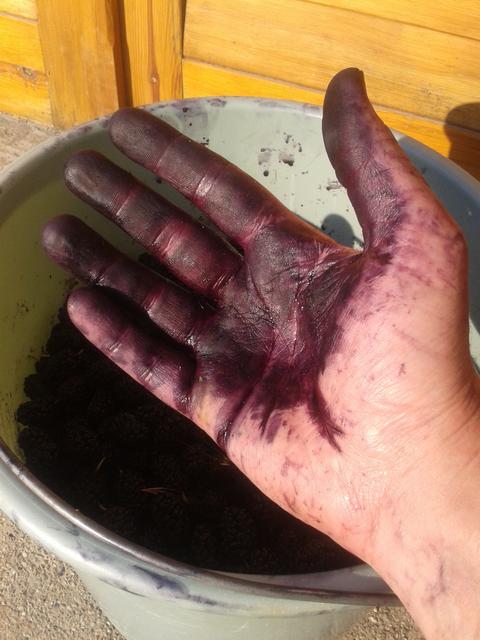Gardening tips for Hungarian soil and climate?
Last activity 11 October 2020 by fluffy2560
7213 Views
77 replies
Subscribe to the topic
Post new topic
As we went off topic with gardening I thought I would start and new tread.
If anyone has any tips on what grows easily in different regions of HU and can offer any advice on where to buy supplies, seeds etc. I am sure it will be helpful as spring growing season will soon be here.
I would love to grow some fresh herbs in my windowbox.
Which herbs are the heartiest for direct sunlight conditions do they need to be grown in a shady place?
Tried growing parsley and it just burnt up on us.
Space is limited in the flat so herbs that grow upright and are hardy would be best.
I noticed Mulberry trees had been mentioned in a previous post about gardening.
I know in the US southwest they are now illegal to grow. Too many issues with pollen and allergies.
Not native trees to the SW.
Not sure they are legal in Hungary I noticed awhile back that even Hungary was having issues with allergies running wild.
Marilyn Tassy wrote:Which herbs are the heartiest for direct sunlight conditions do they need to be grown in a shady place?..
Try growing chives. Very nice chopped up on salads - like onions. We've got a really nice chive plant that has lasted for years outside in all sort of conditions. It produces huge amounts of chives but one has to keep it watered as conditions are quite tough in HU during the summer. Coriander (has another name in the USA) is quite easy to grow as well.
I am also currently experimenting with a kind of lemon grass found in Africa. One can make lemon flavoured tea with it. It's absolutely profuse there almost like a weed and gets really busy quickly but struggles in HU. It should do really well in the summer if the temperature doesn't drop below say, 15 C, but would need to be kept indoors in winter. Not something for an apartment without a balcony.
The one I always fail on is tomatoes. They are quite hard to grow on a balcony in Hungary but one can try smaller dwarf varieties that can be grown in hanging baskets. I had very limited success. They need a lot of watering every day. If you are not watering them all the time, they split. But if you get a good one they are very tasty.
Thanks, yes coriander is one of my faves, love to make homemade salsa.
Any advice on where to find seeds?
I am in the US right now and hope to perhaps bring a small amount of seeds from a garden shops here, all packaged, hope I am able to both remember to buy some seeds and hope there is no issue with bringing in a small package.
If you know a good place in HU to buy seeds that would be lovely.
Marilyn Tassy wrote:....If you know a good place in HU to buy seeds that would be lovely.
Oh, any garden centre will have them. The varieties in HU are more limited but there's a chance they will have been selected for the climate. OBI or similar have garden centres and they are all over.
Coriander is not very exotic so should be quite easy. Curly parsley is quite hard to find. They only seem to know the flat leaf one.
Celery used to be quite difficult. They only seem to know the large bulb one, not the stalks but that has improved of late with normal celery turning up in Tesco.
I wouldn't advise bringing the seeds in from the USA as it would almost certainly violate the customs regulations.
Marilyn Tassy wrote:any advice on where to buy supplies, seeds etc. I am sure it will be helpful as spring growing season will soon be here.
Yes, any gardening store. Small (corner store) or large (big box chains) should be well stocked with a variety of locally adapted vegetable and herb seeds.
However, I recommend buying starter plants for both vegetables and herbs. You are off to a better start, especially with tomatoes as those need to be started in a hot house if you hope to get any reasonable harvest early in the summer. Starter plants you can get at farmers markets or at greenhouse growers.
Some herbs can be tough to start from seeds.
.
Marilyn Tassy wrote:Which herbs are the heartiest for direct sunlight conditions do they need to be grown in a shady place? Tried growing parsley and it just burnt up on us.
Most herbs like sunlight. But some tolerate dry soil and winter conditions better than others. Our sage and tarragon I never water and grow outside. Parsely requires a moist well drained soil, so you have to keep the soil most. Planting in a pot, I recommend getting a good potting soil and mixing in a good bunch of peat (sphagnum) moss (you can buy both in bags). The peat moss will hold a lot of water for the plants to use over longer time periods than just soil alone.
Potting soil may oxidize over time, and its level in the planter may drop. If this happens, simply sprinkle more soil on top as needed.
For outside planters, I would also recommend strawberries (also get some already growing in a pot -- do not bother growing from seed), and put them also in a potting soil and peat moss mixture. Properly cared for they should give a few ripe strawberries each day for most of the summer. And they will survive the winter and just start growing again next spring -- typically if the planter is outside the winter rain and snow falling on the planter then water in the soil in the planter should be enough to get them started in the spring -- when you see them starting to grow again, just remember to keep them watered so they can keep growing.
Marilyn Tassy wrote:I noticed Mulberry trees had been mentioned in a previous post about gardening.
I know in the US southwest they are now illegal to grow. Too many issues with pollen and allergies.
Not native trees to the SW.
Not sure they are legal in Hungary I noticed awhile back that even Hungary was having issues with allergies running wild.
There are white and black mulberry trees in Hungary. Both introduced species. On one of our properties we have both. White mulberry leaves can be harvested, dried and make a very nice tea. White mulberry berries can be dried, stored and eaten like raisins (and are really a health food). Black mulberry berries can make a good jam, syrup, or a decent wine.
But be aware, picking black mulberry berries will stain everything they touch:
Mulberries may be a problem of allergies in Hungary. I do not know. But Mulberries are so ubiquitous now, I doubt there is much one can do at this point. The main concern with allergies in Hungary that I am aware of is due to ragweed (Ambrosia artemisiifolia). There are very strict laws that stipulate ragweed on property must be removed, killed or mowed before July 1st, and it must be prevented from flowering for the rest of the year. Fiscal penalties for not doing so can be quite high.
fluffy2560 wrote:I wouldn't advise bringing the seeds in from the USA as it would almost certainly violate the customs regulations.
As by my personal review, reading and understanding of current EU law, it allows someone entering the EU to bring in their personal luggage up to 5 packages of retail purchased seeds (i.e. no loose seeds from things like heirloom tomatoes allowed) and only for personal use. Beyond that number of retail packages, one is suppose to get an import permit.
Personally, seed that are sold in Hungary grow well in Hungary. There is no real need to bring in seeds from abroad that may not grow well here, IMHO.
Thanks for the gardening tips.
My husband is an expert in growing only one sort of plant, one I will not mention!! ( oh the glory daze)
Most everything else seems to die on us from forgetting to water or forgetting to bring it indoors when the weather turns bad.
I need my salsa fix once in awhile so I may bring in one small package of coriander seeds and check out a garden shop in HU for a starter plant.
Marilyn Tassy wrote:My husband is an expert in growing only one sort of plant, one I will not mention!! ( oh the glory daze)
"God" forbid only the fruit of one plant.
Forbidding everything else is just a human whim and invention based on arrogance, ideology and stupidity.
fluffy2560 wrote:Coriander (has another name in the USA) is quite easy to grow as well.
Fluffy I think you're referring to Cilantro? That's the leaves of the plant, while the seeds are referred to as Coriander if I'm not mistaken. I plan to grow it again this year, I use lots of the stuff 
Romaniac
romaniac wrote:fluffy2560 wrote:Coriander (has another name in the USA) is quite easy to grow as well.
Fluffy I think you're referring to Cilantro? That's the leaves of the plant, while the seeds are referred to as Coriander if I'm not mistaken. I plan to grow it again this year, I use lots of the stuff
Romaniac
Well, yes that's the one Cilantro but we refer (in the UK) to Coriander as the whole plant, not just the seeds. They smell the same. The leaves add colour to a dish but too much of it will ruin it. It's used extensively in Indian cooking.
fluffy2560 wrote:Well, yes that's the one Cilantro but we refer (in the UK) to Coriander as the whole plant, not just the seeds. They smell the same. The leaves add colour to a dish but too much of it will ruin it. It's used extensively in Indian cooking.
Cilantro is used a lot in Mexican foods, great for salsas and guacamole, among other things. I was a bit confused when I first came over here and could only find Coriander seeds, not aware that they are in a sense, one and the same...though the leaves and seeds do have some different taste depending on the use 
romaniac wrote:Cilantro is used a lot in Mexican foods, great for salsas and guacamole, among other things.
One can not have a proper and correct salsa or guacamole without cilantro. 
So true, nothing like fresh cilantro.
Think it is often used in Thai cooking as well as in Mexican.
I have been OD ing on cilantro while on holiday here in the US.
Found a Mexican grocery store where it is so cheap and fresh I have been putting it in almost everything, tuna salad's, soups, just eating it as is.
Hardly ever see it sold in the markets in Hungary.
Did buy a package in HU of coriander seeds, not worth a thing, didn't do much when using it to cook, have to grow my own.
Very strange to refer to my visit home in the US as a "holiday"
so odd to be an ex pat sometimes...
The climate in Hungary used to be very different from the UK but I have noticed in recent years that things are evening up. For example there has been more rain in Hungary and the winter has not been as harsh.
It is nice for me to have a bit more space to grow things . So if anyone can recommend any good nurseries or garden stores near Budapest I will be pleased.
It was the dark berried mulberry that I saw growing at an orchard that I visited but now I know I would like to try growing both types.
I also don't think that there are many restrictions on what we can grow. Allergies do seem to be on the increase but only certain things trigger off my hay fever.
By the way, end of March. Last chance to get your seed starters going for this year. Still time to get your tomatoes and peppers started from seed. A bit late... but still time.
klsallee wrote:By the way, end of March. Last chance to get your seed starters going for this year. Still time to get your tomatoes and peppers started from seed. A bit late... but still time.
I brought some tomato seeds (Moneymaker variety) in from the UK and they didn't do well in Hungary. I think it's too hot and dry for them in the summer. They need lots and lots of water every day otherwise the skins split. Mrs Fluffy is having another go this year with a local variety.
I am not sure how apples and pears grow without needing lots of water.
We managed some cucumbers last year - 3 of them (that's not 3 tonnes), that's 3 whole cucumbers. Great. Probably didn't water them enough.
One thing I'd like to have a go with is runner beans. These are very popular in the UK but they also don't do well in Hungary for some reason.
We have got a couple of really excellent plants - a chives plant that's survived for years outside and seems really hardy. Just needs watering. It's really prolific and we've managed to split it into 3 now.
We also have a chilli plant that's survived about 5 years. It dies back a bit but comes back nicely each year if we keep it inside over winter but it does really well outside when the proper summer weather comes.
I have a lemon grass plant which comes from Africa. It doesn't do badly outside in a pot but suffers horribly in the winter so we bring it inside now but it's not very prolific. Shame as you can use the leaves for a lemon tea.
My neighbour has an excellent greengage (plum) tree. I am hoping to try and get one of those going from seeds but I think realistically I might as well just buy one that's already growing properly in a pot.
fluffy2560 wrote:I brought some tomato seeds (Moneymaker variety) in from the UK and they didn't do well in Hungary. I think it's too hot and dry for them in the summer. They need lots and lots of water every day otherwise the skins split. Mrs Fluffy is having another go this year with a local variety.
Good plan to go with a local variety.
My tomato starters are already up and growing. In fact, I think I will have too many.
fluffy2560 wrote:I am not sure how apples and pears grow without needing lots of water.
Well, it depends of local climate of course. There needs to be enough native soil moisture to keep them going. For new plants, plant them in the fall. Then there is enough winter soil moisture to keep them good the next year in most cases and their root zone has settled enough to access that moisture. Planting trees in the spring is doable, but may require watering. I never water any of our fruit trees (including apple and pear).
fluffy2560 wrote:We managed some cucumbers last year - 3 of them (that's not 3 tonnes), that's 3 whole cucumbers. Great. Probably didn't water them enough.
Oh! That is sad. 
Probably either not enough water or poor soil (not enough organic material or fertilizer).
Also, use starters. Plant your seeds... well about now.... keep them indoors for a week at least in a warm place. When they start to sprout, put them outside, keep them watered, and take them in at night if the night gets too cold. Then plant at end of April or early May outside after last frost in a well prepared and rich soil.
I had so many cucumbers last year, I could not give them all away and many went to waste.... 
fluffy2560 wrote:We have got a couple of really excellent plants - a chives plant that's survived for years outside and seems really hardy. Just needs watering. It's really prolific and we've managed to split it into 3 now.

fluffy2560 wrote:My neighbour has an excellent greengage (plum) tree. I am hoping to try and get one of those going from seeds but I think realistically I might as well just buy one that's already growing properly in a pot.
Some plumb tree varieties will sucker from their roots. And they can be a darn nuisance if you don't want them to spread. But those varieties are also very hardy.
klsallee wrote:....
My tomato starters are already up and growing. In fact, I think I will have too many.
... Then there is enough winter soil moisture to keep them good the next year in most cases and their root zone has settled enough to access that moisture. Planting trees in the spring is doable, but may require watering. I never water any of our fruit trees (including apple and pear).
......
Probably either not enough water or poor soil (not enough organic material or fertilizer).
....Then plant at end of April or early May outside after last frost in a well prepared and rich soil.
I had so many cucumbers last year, I could not give them all away and many went to waste............some plumb tree varieties will sucker from their roots. And they can be a darn nuisance if you don't want them to spread. But those varieties are also very hardy.
The greengage apparently can be planted any time if it's been grown in a pot. We've put in some apples and pears but not seeing any buds on them. Might be the dog chewing on it that's damaged it beyond repair. My neighbour is pretty friendly. I think I could ask him for cuttings maybe and try to grow some trees from them.
Mrs Fluffy is on tomato duty. She seems to have a few plants on the go now and judging by their vigorous nature they will be doing well. We have a hallway and stairwell which is almost a greenhouse, very large windows and plenty of space. Mainly it's full of house plants but really it could have a lot of other stuff in it that's productive.
As I've mentioned before, we've been toying for ages for a well to improve our watering capability after our cucumber fiasco but now we're abandoning the idea of the IBC tanks and going to have an underground tank and drain the rainwater from the house and shed into it. Then we can pump it out for the garden.
We've got the remains of an old septic tank there, so we're going to have that removed or dug out and the big hole can be used for this water tank. These are out first thoughts anyway.
One thing I don't know about is how big it should be. Basically we want to water the garden with it and that's it. The builder/landscaper is talking about 3 cubic metres - i.e. 3000 litres - which seems a huge amount. But perhaps it's necessary during extended dry periods.
Interesting to see how big it should be - not that I know how much should be used per month. My thoughts are as follows:
Rainfall in Budapest is about 530mm per year in total so that's 530 litres a year (per m2) average or about 44 litres a month (seems a lot) - halve it for worst case means 22 litres a month. Summer days average about 7 wet days per month, so that's 22 * 7 or 154 litres per month per m2 which over a collection area of say 100m2 terms means 15400 litres a month. So to get 3000 litres, I could fill up 5 times a month during the summer.
That seems ridiculously large and rather a lot of rain to me. Does it really rain that much in HU?
Maybe I got it wrong.
fluffy2560 wrote:The greengage apparently can be planted any time if it's been grown in a pot.
Correct.
But..... "any time" is not the same as "ideal time".
You will have better success if you plant any fruit tree, even container trees, in the fall or early winter. Then you will be planting when dormant, which will benefit the late winter and early spring root system growth in a fixed, undisturbed soil, so you will be disturbing these same roots the least, especially very delicate rhizomes and micro rhizomes and mycorrhiza. The later are very important to water and nutrient uptake.
klsallee wrote:fluffy2560 wrote:The greengage apparently can be planted any time if it's been grown in a pot.
Correct.
But..... "any time" is not the same as "ideal time".
You will have better success if you plant any fruit tree, even container trees, in the fall or early winter. Then you will be planting when dormant, which will benefit the late winter and early spring root system growth in a fixed, undisturbed soil, so you will be disturbing these same roots the least, especially very delicate rhizomes and micro rhizomes and mycorrhiza. The later are very important to water and nutrient uptake.
Good technical tips but..... I'm not that organised and when it comes to gardening, I'm with Freddie Mercury..."I want it all, I want it all, I want it all, and I want it now".
Maybe I've got the wrong attitude and this explains my pathetic horticultural superpowers.
I have found a huge patch of Lily of the valley, growing on my area of the community forest. I would like to move some into my garden.
Should I do it now or wait til September?
I've been looking at my compost heap and thinking it doesn't look very productive and stuff seems to take ages to rot down. I always see people with steaming compost heaps producing compost very quickly and mine looks cold.
Anyone got any tips for improving my composting? Should I turn it over regularly?
I think possibly I should take a whizz over it. I've heard that helps.
fluffy2560 wrote:I've been looking at my compost heap and thinking it doesn't look very productive and stuff seems to take ages to rot down. I always see people with steaming compost heaps producing compost very quickly and mine looks cold.
Anyone got any tips for improving my composting? Should I turn it over regularly?
I think possibly I should take a whizz over it. I've heard that helps.
Fluffy try a wormery. There are videos on Youtube on how to make your own for free. My da has one back in Wales and he leaves [them]
the worms to do the work.
I've never got round to doing it here, but its on the list. (cough after 10 years) I always get something else pressing to do, then time runs out. lol
SimCityAT wrote:.....
Fluffy try a wormery. There are videos on Youtube on how to make your own for free. My da has one back in Wales and he leaves [them]
the worms to do the work.
I've never got round to doing it here, but its on the list. (cough after 10 years) I always get something else pressing to do, then time runs out. lol
Good tip but where does one get the worms from? Fishing shops?
fluffy2560 wrote:SimCityAT wrote:.....
Fluffy try a wormery. There are videos on Youtube on how to make your own for free. My da has one back in Wales and he leaves [them]
the worms to do the work.
I've never got round to doing it here, but its on the list. (cough after 10 years) I always get something else pressing to do, then time runs out. lol
Good tip but where does one get the worms from? Fishing shops?
That I don't know 
 I got last 2 tomato plants €1 each from Lidl.
I got last 2 tomato plants €1 each from Lidl.
SimCityAT wrote:fluffy2560 wrote:.....
Good tip but where does one get the worms from? Fishing shops?
That I don't knowI got last 2 tomato plants €1 each from Lidl.
Hmmm.....I asked Mrs Fluffy where to buy worms and she said ....Euuughhhh....Might be the end of it. I suppose I could just dig for them.
What's the variety of tomato plants you got from Lidl?
fluffy2560 wrote:Anyone got any tips for improving my composting?
Add fresh horse or cattle manure.
Also, the design and construction of your compost bin may not be optimal.
klsallee wrote:fluffy2560 wrote:Anyone got any tips for improving my composting?
Add fresh horse or cattle manure.
Also, the design and construction of your compost bin may not be optimal.
Yes, could be. But I actually made the compost bin from various designs I saw on the internet.
We've got chicken manure in it (as we have chickens) but no horses or cattle. The chicken's hay goes in every so often when they've destroyed it.
We had a top on it to keep in the heat but it's stone cold. I've thought about leaving the top off to try and get some more air in it but I think I'm just missing the right bacteria or the right worms. What I don't want is a fly farm.
fluffy2560 wrote:Yes, could be. But I actually made the compost bin from various designs I saw on the internet.
We've got chicken manure in it (as we have chickens) but no horses or cattle. The chicken's hay goes in every so often when they've destroyed it.
We had a top on it to keep in the heat but it's stone cold. I've thought about leaving the top off to try and get some more air in it but I think I'm just missing the right bacteria or the right worms. What I don't want is a fly farm.
There are many different designs for compost bins. Such at the load at top, remove at bottom type. Or the double bin (you stir-move the compost between them about every 7 to 10 days to keep it aerated). And so on. Also, you do not normally put a "top" on a compost bin to keep in heat, but to keep out rain. And if you see "steaming" piles, that means someone may have done something wrong as it is either wet (which you don't want) or has too much green material (ration of green to brown material should be 2:1 ideally).
Chicken manure is fine to compost, but it can have Salmonella or E. Coli bacteria so very important to get high temps for such material to kill off the bacteria. Don't rely on the surface temps, and if you don't do it already, get a long probe thermometer to check internal temps.
A cubic meter of material can take a year to compost. The more you stir and mix and aerate, it can go a little faster. But don't expect to be done too quickly, especially if you only have one bin and keep adding to it.
klsallee wrote:fluffy2560 wrote:Yes, could be. But I actually made the compost bin from various designs I saw on the internet.
We've got chicken manure in it (as we have chickens) but no horses or cattle. The chicken's hay goes in every so often when they've destroyed it.
We had a top on it to keep in the heat but it's stone cold. I've thought about leaving the top off to try and get some more air in it but I think I'm just missing the right bacteria or the right worms. What I don't want is a fly farm.
There are many different designs for compost bins. Such at the load at top, remove at bottom type. Or the double bin (you stir-move the compost between them about every 7 to 10 days to keep it aerated). And so on. Also, you do not normally put a "top" on a compost bin to keep in heat, but to keep out rain. And if you see "steaming" piles, that means someone may have done something wrong as it is either wet (which you don't want) or has too much green material (ration of green to brown material should be 2:1 ideally).
Chicken manure is fine to compost, but it can have Salmonella or E. Coli bacteria so very important to get high temps for such material to kill off the bacteria. Don't rely on the surface temps, and if you don't do it already, get a long probe thermometer to check internal temps.
A cubic meter of material can take a year to compost. The more you stir and mix and aerate, it can go a little faster. But don't expect to be done too quickly, especially if you only have one bin and keep adding to it.
We've only the one bin. We used up the last one's contents to make a vegetable bed - which worked mostly OK - we had 3 cucumbers. The last bin was made of plastic and wasn't really up to the job. So that was dumped as it was pretty broken.
This is a new design with wood sides making slat type holes along the edges to let the air in. The top was made out of leftover foam insulation panels to keep the rain off but also the heat in during the winter but I've seen a bit of old carpet will do the same job. I could just take the top off and see what happens.
The bin is probably about 1.5m square and only about 50cm high with material in it at the moment as some of it has rotted down slowly over winter. But it's definitely not wet and it looks like there's plenty of air moving in there but I have seen on YouTube that steam shows it's working - some reports say 3 weeks to get decent compost. And it needs a bit of water on it.
I've seen those "twin bin" designs on the Internet but I thought it was a bit too much hard work to make from scrap wood at the time. I suppose I could divide my existing bin to try and improve turnover. We need some more for our vegetable beds.
The worm idea is a no-no. I read up on it and the temperatures produced by the bacteria will kill the worms. I am wondering if I should get some accelerator as I am really impatient for compost! We're probably going to take a whizz in a bottle, dilute and pour that on to try and give it a boost.
fluffy2560 wrote:some reports say 3 weeks to get decent compost.
For a normal, average, composting bin, that claim is drifting into homeopathy territory..... 3 months is "possible", if you get a hot composting going on a lot of non-woody material, but quite frankly I let my compost go at least 6 to 9 months before using. For example, my late summer bin, which I stopped adding to in August, composted over late summer, fall and winter, I used this year to replant my vegetable starters this month into larger trays.
I suggest watching composting by Charles Dowding (he has been doing this for decades, and knows what he is doing).
https://www.youtube.com/watch?v=Kf6CGj7xpFE
You will also notice, his compost bins are very simple. One does not really need to overthink composting.
klsallee wrote:fluffy2560 wrote:some reports say 3 weeks to get decent compost.
For a normal, average, composting bin, that claim is drifting into homeopathy territory..... 3 months is "possible", if you get a hot composting going on a lot of non-woody material, but quite frankly I let my compost go at least 6 to 9 months before using. For example, my late summer bin, which I stopped adding to in August, composted over late summer, fall and winter, I used this year to replant my vegetable starters this month into larger trays.
I suggest watching composting by Charles Dowding (he has been doing this for decades, and knows what he is doing).
https://www.youtube.com/watch?v=Kf6CGj7xpFE
You will also notice, his compost bins are very simple. One does not really need to overthink composting.
Excellent video. Thanks for the tip on that. Other videos I've seen are not as good as that one. I have a similar bin to the chap in the video with slatted sides but he has multiple bins he can turn over. Obviously a professional. He should be on TV.
Anyways, I've been outside and taken the top off and given it a bit of a wetting. I'll try and turn it over tomorrow. Fingers crossed for rapid compost!
In the autumn I would like to plant more wildflowers seed in my garden . In the uk and in Budapest along the river local councils are planting wildflower areas and if the seed contains perennials it is far less maintenance than grass.
Does anyone know where I can buy wildflower seeds suitable for the Hungarian climate ? ?
anns wrote:In the autumn I would like to plant more wildflowers seed in my garden . In the uk and in Budapest along the river local councils are planting wildflower areas and if the seed contains perennials it is far less maintenance than grass.
Does anyone know where I can buy wildflower seeds suitable for the Hungarian climate ? ?
Garden centre?
anns wrote:In the autumn I would like to plant more wildflowers seed in my garden . In the uk and in Budapest along the river local councils are planting wildflower areas and if the seed contains perennials it is far less maintenance than grass.
Does anyone know where I can buy wildflower seeds suitable for the Hungarian climate ? ?
Locally produced bird seed?
fluffy2560 wrote:Locally produced bird seed?
Those are usually not perennial seeds but annual seeds like sunflower or millet.
SimCityAT wrote:anns wrote:In the autumn I would like to plant more wildflowers seed in my garden . In the uk and in Budapest along the river local councils are planting wildflower areas and if the seed contains perennials it is far less maintenance than grass.
Does anyone know where I can buy wildflower seeds suitable for the Hungarian climate ? ?
Garden centre?
Second garden center/centre as a source for perennial seeds. And if they do not have seeds, just buy a few small plants, and save the seeds they produce for more plants.
Also most perennials can be simply mass propagated via cuttings.
If you have access and allowed, you could collect some wildflower seeds?
SimCityAT wrote:You can get free in the UK from HERE
BTW, Poundland (in the UK) has some semi-useful bulbs and seeds but caution advised, I was only successful here with about 1/2 the contents of packets I bought - the rest did mainly nothing.
I also felt "cheated" as the daff bulbs I bought turned out to be dwarf variety! Typical Poundland "shortchanging" on quantity.
While I'm here waffling, my compost heap is going very well. I now turn it over every so often and this has helped a lot. I also give it a spray now and again and it's "working" better than it has been. It's naturally full of worms - easy to see them in there. I think turning it over ensures plenty of material under the surface to keep the aforementioned worms happy.
Articles to help you in your expat project in Hungary
 Customs in Hungary
Customs in HungaryAs a member of the EU/EFTA, Hungary supports the free movement of goods within the EU/EFTA area. There are no ...
 Buying property in Budapest
Buying property in BudapestBuying a house or a flat can be a good option if you are planning to long term stay in Budapest. However, it is ...
 Driving in Hungary
Driving in HungaryHungary has an extensive road network, big parts of which have been recently updated to facilitate traffic. The ...
 Sports in Budapest
Sports in BudapestSports is a great way not only to stay fit but also to keep yourself busy during your stay in Budapest. Whether ...
 Childcare in Hungary
Childcare in HungaryAs Hungary is an EU member, it adheres to the EU premise that all citizens should be entitled to equal childcare ...
 The work culture in Budapest
The work culture in BudapestCongratulations! You have been hired by a company for a job in Budapest. Depending on the position you will ...
 The taxation system in Hungary
The taxation system in HungaryIf youre living in Hungary, you are subject to paying taxes in the country for all the income you may have earned ...
 Become a digital nomad in Hungary
Become a digital nomad in HungaryHungary may not be the first place that comes to mind when you think of an ideal digital nomad destination. With ...
Find more topics on the Hungary forum



